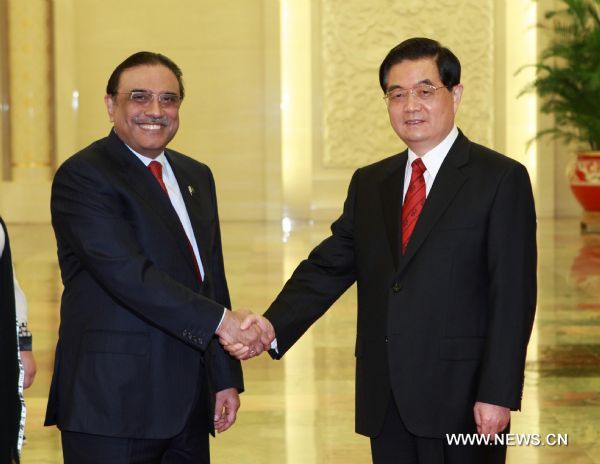China, Pakistan ink 6 deals
China and Pakistan signed six deals in Beijing on Wednesday, and pledged to make joint efforts to fight terrorism.
 |
|
Chinese President Hu Jintao (R) meets with Pakistani President Asif Ali Zardari at the Great Hall of the People in Beijing, capital of China, on July 7, 2010. [Pang Xinglei/Xinhua] |
Chinese President Hu Jintao and visiting Pakistani President Asif Ali Zardari witnessed the signing of the six deals, which cover areas such as agriculture, healthcare, justice, media, economy and technology.
During the two-hour-long talks before the signing ceremony, Hu and Zardari also vowed to jointly fight the "three forces" of extremism, separatism and terrorism.
China and Pakistan are both victims of terrorism, the anti-terror cooperation between the two countries on fighting the "three forces" complies with the interests of both peoples and is conducive to peace, stability, security in the region, said Hu.
Echoing Hu's remarks, Zardari said Pakistan and China would work together to combat the "three forces" so to jointly safeguard peace and stability in the region.
As a sign of closer cooperation on fighting terrorism between the neighbors, currently a joint anti-terrorism drill, code-named "Friendship-2010," is being held between China and Pakistan's armed forces in northwest China's Ningxia Hui Autonomous Region.
On trade cooperation, Hu said China would explore new ways to cooperate as well as cement cooperation between the two countries in such areas as energy, transportation, telecommunication, infrastructure and agriculture.
The 60th anniversary of the establishment of China-Pakistan diplomatic ties falls in 2011 and the two countries should prepare early for the celebrations, said Hu.
Hu appreciated the efforts the Pakistani government had made to safeguard the security of Chinese nationals and organizations in Pakistan.
Now there are more than 120 companies and over 10,000 Chinese nationals in Pakistan, engaged in fields like mining, energy exploration and infrastructure.
Zardari hoped the two countries could further enhance cooperation in areas like energy, financing and transportation, and invited more Chinese firms to invest in Pakistan.
Pakistan would create a secure environment for Chinese firms, said Zardari.
Hu said China attached importance to Pakistan's unique influence and role in regional affairs, and China would enhance coordination with Pakistan within the framework of South Asian Association for Regional Cooperation and the Shanghai Cooperation Organization.
China would continue to maintain contacts with Pakistan on issues like the reform of the UN Security Council and climate change in order to ensure the common interests of the developing countries, said Hu.
China and Pakistan are good neighbors, friends, partners and brothers, and China would work with Pakistan to push forward the bilateral strategic partnership in a comprehensive manner so to contribute to regional peace and stability, said Hu.
Zardari arrived in Beijing Tuesday evening on a five-day working visit to China, the fifth China tour since he became president of Pakistan in 2008.
On Thursday, Chinese Premier Wen Jiabao and top political advisor Jia Qinglin will also meet with Zardari.
Zardari will leave Beijing for Shanghai later this week, and visit the Pakistani National Pavilion at the Shanghai World Expo.
 0
0 






